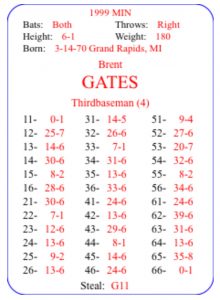
If you’re a reader of the APBA Blog, you’re probably a big sports fan. More than likely, you’re a big baseball fan too and have met a few big leaguers over the years. Most of the time, we meet professional athletes at autograph signings or other team functions. Rarely do we deal with former Major Leaguers in other settings. However, that’s not the case with me and Brent Gates. I’ve been dealing with him for over a decade.
Brent Gates grew up in the Grand Rapids, Michigan area and attended Grandville High School. After graduation, he attended the University of Minnesota on a baseball scholarship and became an All-American. In 1991, he was the Oakland A’s first round draft pick. After seven successful seasons in the Major Leagues, Gates managed the Class-A West Michigan Whitecaps in 2001. However, Gates’s
Thirteen years ago, I started umpiring high school baseball in West Michigan. Before I knew it, I was dealing with Gates as he piloted the Grand Rapids Christian Eagles to two State Championships. Now, most coaches have their quirks, but it’s different from a former MLB player. They bring a certain intensity that’s missing from other games I’ve umpired, especially when the games mean a little bit more. The first time I had Gates in a State Regional, I called his runner out for stealing in the top of the first inning. The play wasn’t very close, but Gates came out anyway. After a brief, but animated conversation, Brent accepted my explanation and headed back to the dugout. Gates knew his runner was out, but he was just using the situation to get his team fired up. In all the years I’ve been umpiring, very few coaches have ever tried that tactic. That year Gates won his first of two State championships at Grand Rapids Christian High School.
After taking time off for his children, Gates was coaching at Byron Center High School until last season. I again was umpiring the State Regional he was coaching in when a close play occurred on the bases. At the time, I was working the plate, so Brent went out to speak with my partner about the play. After an intense discussion, Gates was satisfied with the explanation and headed back to the dugout. After the game, I asked my partner about the conversation. He told me Brent started the conversation by saying, “Don, why don’t you kiss me while you’re at it.” I’d never heard that one; I had to laugh.
| Split | G | GS | PA | AB | R | H | 2B | 3B | HR | RBI | SB | CS | BB | SO | BA | OBP | SLG | OPS | GDP | SH | SF |
|---|---|---|---|---|---|---|---|---|---|---|---|---|---|---|---|---|---|---|---|---|---|
| 1999 Totals | 110 | 71 | 346 | 306 | 40 | 78 | 13 | 2 | 3 | 38 | 1 | 3 | 34 | 56 | .255 | .328 | .340 | .668 | 11 | 2 | 3 |
Brent Gates was only 29 years old in his final season, but it was a typically solid year for him. In 1999, Gates hit .255 with three homers and 38 RBI in 110 games. A switch hitter whose primary position was second base, Gates was versatile throughout his career, playing third base, shortstop, first base, left
So often, we talk about the exceptionally great players. However, it’s nice to look at the solid, former Major Leaguers who accomplished things most of us can only dream about. How great would it be to claim you had 616 big league hits and a .264 lifetime average? Just to play one day in the Majors is an accomplishment. To play seven seasons and produce a career 5.5 WAR is a tremendous accomplishment. Gates played for managers like Tony LaRussa, Tom Kelly, and Lou Piniella. He was teammates with Hall of Famers like Rickey Henderson, Ken Griffey, Jr., and Edgar Martinez. There aren’t too many people walking the streets who can say that.



